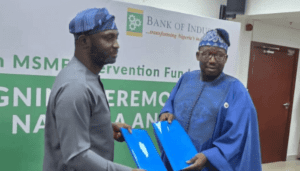NBS, CBN to commence household survey in 33,300 households in Nigeria
The National Bureau of Statistics (NBS), in partnership with the Central Bank of Nigeria (CBN) is set to commence the National Integrated Household Survey in 33,300 households across the country.
The Statistician-General of the Federation, Prince Semiu Adeniran, said this at a news conference on the NBS-CBN Collaborative National Integrated Household Survey held at the NBS Headquarters in Abuja on Thursday.
According to him, this is the first time an Integrated Household Survey of this nature and scope is being implemented.
Adeniran said the survey, which was to be conducted on a quarterly basis, was aimed at generating reliable estimates on households’ income and expenditures, as well as insights into their economic behavior and financial situation.
“Specifically, the scope of the survey covers the educational background and status of the households, their consumption and expenditure profiles, household assets and propertys.
“Others are access to financial services and credit constraints, incomes and savings, as well as information on household enterprises among others.’’
He said the data would be used for tracking the success or otherwise of several policies and interventions put in place in recent years by the government in response to the macro and socio-economic effects of the COVID-19 pandemic.
The statistician-general said that some people had already been trained extensively on the design, methodology and protocols for administering the survey.
He said the workshop where they were trained was referred to as Training of Trainers, adding that it had officers drawn from both NBS and CBN.
“Over the next couple of days, these officers will travel across the country to each of the states of the federation to cascade this training to carefully nominated enumerators and field personnel.
“After the training at that level, data collection will commence in selected households and enumeration areas across the states,’’ he said.
Adeniran said technology would play a significant role in the process as data collection would be done electronically and transmitted real-time to minimise errors, improve quality, and make for a more efficient process.
According to him, this will also be complemented by remote and face-to-face monitoring to further ensure good data quality.
Adeniran said trained data editors and assistants would monitor the electronically transmitted data in real time and provide feedback to enumerators in the field where necessary.
According to him, senior officers from both organisations will pay on-the-spot visits to the field across each state to monitor and coordinate the operations.
“They will also confirm that laid down protocols for the conduct of the exercise are being followed appropriately.
“Modern statistical applications for data analysis will be adopted for the processing and analysis of the data collected.
“This will be coordinated by the ICT Department of the bureau, with adequate participation from the officers of the CBN.’’
He said that all of these measures and procedures were put in place to guarantee and enhance the reliability and suitability of the process so that the quality of the final results was assured.
The statistician-general appealed to respondents across all the states in the federation and the FCT for their full cooperation in providing accurate information to the interviewers.
“I want to assure you that the information provided will be purely used for statistical purposes and treated with utmost confidentiality, as is required of us by the Statistical Act 2007.”
He also requested for the full cooperation of the local community leaders and district heads across the selected enumeration areas in providing support to the enumerators to make their work safe and smooth.
Mr Bello Yakubu, the Deputy Director, Monetary and Financial Statistics, CBN, in his remarks said that the survey was one of the series of collaborations the CBN had with the NBS.
Yakubu said that the survey was aimed at providing credible data and information that would aid policy articulation on the economy as a whole.
According to him, the survey will help give us good policies that will give sound direction in terms of the impact on the economy.
Yakubu said that the collaboration with the NBS which was well thought of and well-designed was in line with international standards.
He also appealed to the households that would be surveyed for their maximum cooperation in given the field officers the right information.
Yakubu assured them that their identity would not be revealed and their data would be aggregated and treated with utmost confidentiality.
“So, please as you listen to this news briefing, give us the maximum cooperation when we come to knock at your door.
“Our numerators will be coming with a form of identification to you, before you give any information, ask for their identification,” he said.
Dr. Micheal Mba, Head, Real Sector and Government Statistics Division of the CBN, who spoke on the sidelines, said the households had been randomly selected to ensure that both rich and poor households were captured.
Mr Kola Ogundiya, the Deputy Director, Household Statistics Division, NBS said the survey would cover 60 enumeration areas per state, and 15 households would be surveyed in each enumeration area.




